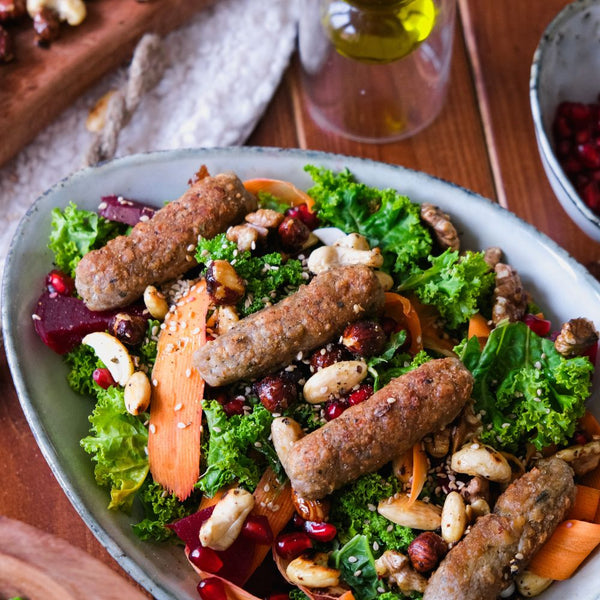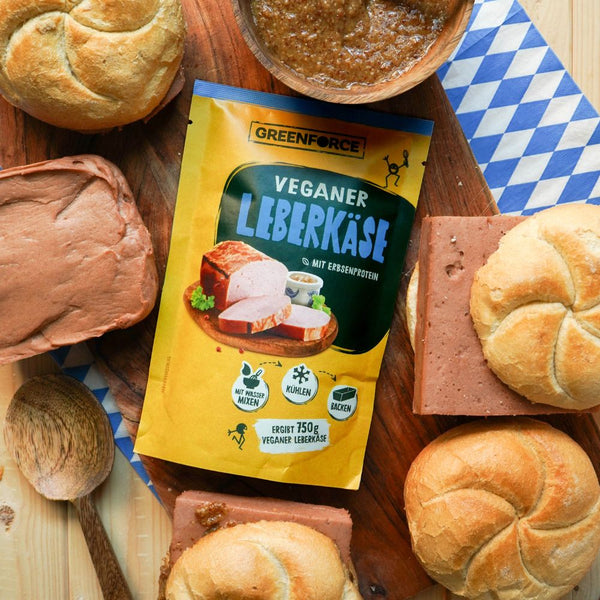When asked “ What do vegans eat ? ”, the topic of cheese often comes up. As an animal product it is taboo, but at the same time very popular. Which is one of the reasons why some people find it difficult to get started with a plant-based diet.
Reason enough for industrial production to increasingly bring vegan cheese substitutes onto the market. The growing availability in various food markets makes it easy for vegans and the curious to choose an alternative.
In addition, there are more and more creative recipes to conjure up delicious alternatives in the home kitchen .
Cheese alternatives from the grocery store
There is already a wide variety of manufacturers and brands of vegan cheese substitute products . These usually also produce other plant-based alternatives for animal products, such as sausage or meat substitutes .
When it comes to ingredients and quality, there are sometimes huge differences. This is due to the possible basic ingredients from which a plant-based cheese alternative can be made .
Likewise with the - sometimes synthetic - additives that appear on the list of ingredients. Added to this are the differences between conventional products and organic products.
It is therefore always worth taking a close look at the list of ingredients. And not just because of the ingredients and their nutritional value. But for environmental reasons also on the origin and manufacture of the products.
This applies, for example, to certain ingredients such as coconut or palm oil. But also in relation to the use of additives. EU organic seals such as Naturland or Bioland demonstrate strict guidelines in this regard.
It is also important that you choose a cheese alternative that you like and tolerate well. Because some plant-based cheese alternatives have, among other things, a high fat content.
Or consist of potential allergens such as soy. Luckily, there are more and more vegan alternatives , so you're sure to find something that's right for you.
This is what plant-based cheeses are made of
As described, there are numerous differences between the individual types of cheese depending on the manufacturer, brand and product. However, of course there is a consensus on the ingredients.
In addition to water and vegetable oils, there are...
- vegetable starch,
- Yeast,
- Spices,
- flavors,
- stabilizers and
- Dyes
on the ingredients list.
There is also a base in the form of soy, cashew nuts or almonds, peas and wheat . Depending on the product, the focus is on a different base or mixture.
You can also see the weighting of the ingredients by looking at their order on the label of the vegan alternative. The composition always depends on which type of cheese a cheese substitute product imitates .
Accordingly, manufacturers try to achieve a certain consistency in addition to the taste. And to create the appropriate conditions for further use, as is the case with cheese alternatives for grated cheese .
If you want to keep it simple, either choose products with the shortest possible list of ingredients. Or take a look around the diverse world of recipes for vegan cheeses and prepare an alternative yourself .


What kind of vegan cheese is there?
Product development has made tremendous progress in the recent past. Accordingly, the question of which vegan cheese is available almost no longer arises. But rather, which doesn't exist.
The alternatives include, on the one hand, the different types of cheese. For example, fresh, semi-hard, soft or hard cheese. On the other hand, there is an increasing number of plant-based cheeses as an alternative to their animal counterparts such as Cheddar or Parmesan .
How large the selection is depends on the manufacturer and retail availability.
Accordingly, you will find the following vegan cheese alternatives in particular:
- Mozzarella
- Feta
- processed cheese
- cream cheese
- Grated and sprinkled cheese such as Parmesan or pizza melt
- Sliced cheese, for example as a replacement for popular cheeses such as Gouda
What about the nutritional value of vegan cheese substitutes?
Cheese provides nutrients such as protein , fat and calcium. Accordingly, when it comes to vegan alternatives, the question arises as to what nutrients they offer. It is often a question of whether they are suitable as vegan protein sources.
It is important to take a closer look at the ingredients. More precisely, the basis of the vegan cheese variety. Because what and to what extent it is in it determines the nutrient content.
It's best to look at what's at the top of the ingredient list. This provides a good guide as to what to expect in terms of nutrients. Also pay attention to the salt content so as not to consume too much of it.
As a rule of thumb for guidance : Anything that consists largely of fats and additives tends to provide the fewest nutrients. This is particularly true if, in contrast, there are few or no nutrients in the product.
Cheese alternatives therefore do not always mean an alternative in terms of nutrient supply. But: There are many commendable examples here, especially as product diversity grows. Just look around at the most popular vegan cheeses and you're sure to find what you're looking for.
The key thing is just as important for animal as for plant-based cheese: enjoy it in moderation. When it comes to vegan protein sources, there are many other great foods with which you can fill your daily menu.
These include:
- Legumes such as soy, beans or peas
- Cereals and pseudo-cereals such as oats, spelt, millet, quinoa or amaranth
- Nuts such as walnuts, hazelnuts or macadamia nuts
- "wrong" nuts such as almonds, cashews and pistachios (drupes) or peanuts (legumes)
In addition to protein , these plant-based foods provide many other valuable nutrients. Depending on the product, you benefit from consuming vitamins and minerals, for example. Walnuts, for example, provide unsaturated fatty acids, zinc and vitamin B.
In addition to vegetable protein, legumes such as beans provide you with B vitamins and minerals such as magnesium, calcium and potassium. So use it as a base and enjoy a cheese alternative as a tasty extra every now and then.

Prepare your own cheese alternative - a colorful variety of recipes
To make a delicious vegan cheese alternative yourself , all you need is the right ingredients and simple kitchen utensils. If you're looking for a plant-based alternative to Parmesan, simply using nutritional yeast is enough.
Because of their spiciness, these can be found in many cheese alternatives. They also work well with breadcrumbs or finely chopped nuts. When baked, for example, this creates a nice “ cheese crust ” and extra flavor.
Another top basic ingredient is cashew nuts. You can use them to conjure up many cheese alternatives such as tender vegan mozzarella , creamy cream cheese or spicy semi-hard cheese.
You should also have ingredients such as vegetable gelatin in the form of agar-agar, starch and psyllium husk in the house. They help you give your cheese alternatives the necessary consistency if necessary.
Depending on the type of cheese, you will have to invest a different amount of time in its preparation. As with normal cheese variants, their vegan alternatives sometimes go through a maturing process before you can enjoy them. Others, such as plant-based mozzarella, can be made in a very short time.
What all vegan cheeses have in common is that they usually only require a handful of ingredients. So you don't have to go shopping in bulk to prepare a tasty cheese alternative.
You also know exactly what is in your cheese substitute product and can specifically purchase the highest quality ingredients, for example in the form of certified organic products.
Furthermore, each cheese alternative can be refined individually . It's definitely worth trying out! Always remember: The best vegan cheese substitute is the one you like and like.

Preparation example for a vegan cheese hit
To make a cheese alternative , you should have some kitchen tools in the house in addition to the right ingredients. In addition to a high-performance mixer to mix the ingredients, you also need suitable containers. You use this to fill the cheese mixture and let it mature depending on the type of cheese.
A ripening process is achieved with the help of special bacterial cultures. You can order these online, for example. Alternatively, you can use a vegan yogurt or plant-based drink that contains live (!) cultures.
Here is an example of a simple plant-based mozzarella recipe that doesn't take a lot of time:
- You make this from cashew nuts, psyllium husks and spices. Soak 100 grams of cashew nuts in water for at least two hours or, even better, overnight.
- Then throw away the water. To do this, let two tablespoons of psyllium husks soak in around 400 milliliters of water for around 20 minutes. Then put them in the blender along with the water and the soaked cashews.
- Now add the juice of half a lemon and spices. Since mozzarella is plain in this regard, a little salt is enough. Now mix everything thoroughly.
- Pour the finished mixture into a suitable container and let it rest briefly in the refrigerator and cool down. Your homemade vegan mozzarella is ready!
High quality replacement products from Greenforce
With Greenforce you have a wide variety of alternatives for many animal products at your disposal. Manufactured in such a way that you can process them in no time.
On the one hand there are our Easy To Mix products. You just have to mix them with water and you can process them further depending on the product. This is how you can create delicious vegan meat substitutes such as vegan meatballs with our products.
We also offer you a growing number of ready-made refrigerated products such as our vegan bratwurst . These can be enjoyed immediately or heated to taste.
You can easily order our products in our shop. You can also increasingly find them in retail stores. It's best to take a look at your local supermarket!
Since we are constantly working on new products, the future also has plenty more goodies from Greenforce in store. Just become part of our community and stay up to date. We'd love to have you join us!


















